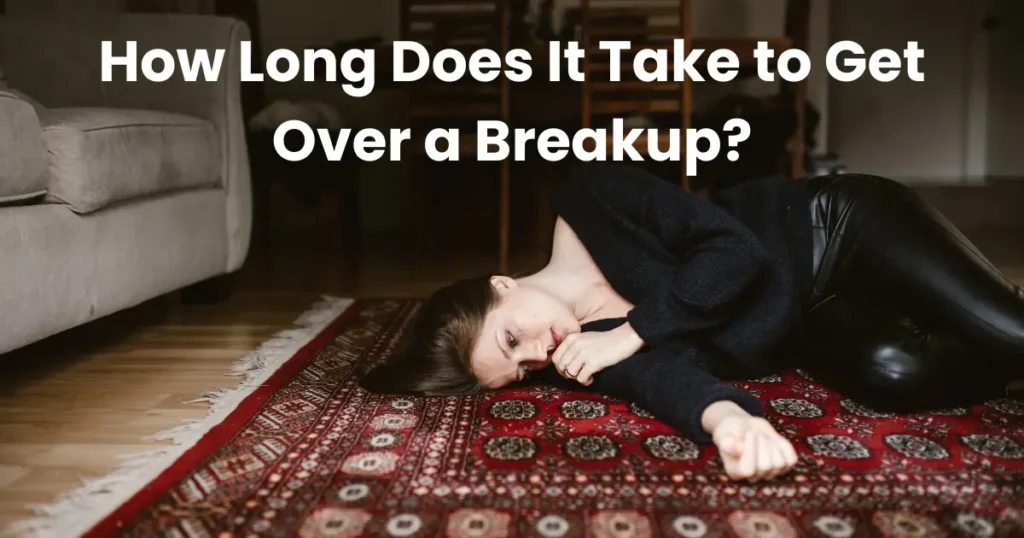Last updated on February 6th, 2026 at 02:32 pm
Breakups hurt. Whether it lasted months or years, letting go of someone you deeply cared for can feel like losing a part of yourself. You might cry out of nowhere, lose sleep, or ask yourself the same painful question again and again:
“How long does it take to get over a breakup?”
The short answer? There’s no fixed timeline. Healing is not linear—it’s messy, personal, and powerful. But understanding what happens to your brain, emotions, and body during heartbreak can help you move through it more gently and confidently.

Why Do Breakups Hurt So Much?
Breakups aren’t just emotional—they are biological. When we fall in love, our brains release dopamine and oxytocin—chemicals that make us feel happy, safe, and bonded. When the relationship ends, we experience a sudden drop in these “feel-good” hormones. It’s like withdrawal from an addiction.
“Heartbreak is a form of withdrawal. The brain craves the person, just like a drug.”
— Esther Perel, Psychotherapist
Research shows that emotional pain activates the same brain regions as physical pain. That’s why a breakup can feel like a punch to the chest. It’s real, it’s valid, and it’s not just in your head. A recent study published in the scientific journal Social Psychological and Personality Science (Chong and Fraley, 2025) further explored the long-term stability of emotional bonds to ex-partners after a breakup, shedding more light on why these connections can linger.
Your brain also reacts to loss with stress. You may feel shock, anxiety, numbness, or intense sadness. This is all part of the psychological effects of a breakup, and understanding this makes healing feel more manageable.
How Long Does Breakup Recovery Take?
There is no universal formula, but researchers and psychologists offer the following estimates:
| Relationship Length | Average Healing Time |
| Less than 6 months | 1–2 months |
| 1–2 years | 3–6 months |
| 3+ years (long-term | 6–12+ months |
But how long does it take to get over a breakup? The truth is—it depends on your situation.
Your own healing depends on factors like:
- Past trauma or mental health history
- Emotional attachment level
- Whether you initiated the breakup
- Your support system
- Use of the no-contact rule
“There is no right or wrong timeline. Some people move on quickly, others take longer—and that’s perfectly okay.” — The Gottman Institute
What Does the Breakup Recovery Timeline Look Like?
- Week 1: Shock & Denial
You might feel disbelief, confusion, or numbness. It’s your brain protecting you from emotional overload.
- Weeks 2–4: Grief, Sadness & Anger
Reality sets in. You may cry, feel angry, or constantly replay old memories. This phase is tough, but it’s necessary.
- Month 2: Acceptance Begins
You start to believe the breakup is final. Pain is still there, but less sharp. You begin imagining a future without them.
- Month 3+: Rebuilding & Self-Discovery
You slowly reconnect with your identity. You find joy in new routines, hobbies, and relationships. Growth becomes visible.
Related read: Feeling Lonely in a Relationship? Find Connection Now!

5 Emotional Stages of a Breakup
- Denial – “This can’t be happening.”
- Anger – “How could they do this to me?”
- Bargaining – “If I just change, maybe they’ll come back.”
- Depression – “I’ll never feel happy again.”
- Acceptance – “It’s over, and I am okay.”
These stages may overlap or repeat, and that’s normal. You are not failing, you are healing.
How to Recover from a Breakup Emotionally
Here are research-backed tips to emotionally heal:
- Let yourself grieve. Cry, journal, rest—don’t suppress the pain.
- Talk it out. Vent to a friend, or speak with a therapist. Isolation only prolongs healing.
- Avoid blaming yourself. Breakups rarely have one cause.
- Reframe the breakup. It’s not a failure—it’s a redirection.
Related read: How to Stop Thinking About Someone
“Breakups are not just endings, they are openings to something better.” — Dr. John Gottman
Power of the No-Contact Rule
Going no-contact means cutting off all communication with your ex. This allows your brain and heart to detach and reset.
Why it helps:
- Prevents emotional relapses
- Gives clarity and perspective
- Breaks patterns of co-dependence
Recommended: 30–60 days of strict no-contact.
Only reconnect if:
- You are fully healed
- You are not hoping to get back together
- There is a valid reason (like co-parenting)
How to Move On After a Breakup
- Prioritize self-care. Sleep well, eat nourishing food, and exercise.
- Rediscover passions. Read, paint, travel—anything that reconnects you with YOU.
- Limit overthinking. When thoughts spiral, ground yourself with mindfulness.
- Try meditation. Even 5 minutes daily can reduce emotional distress.
How Long Does Heartbreak Last? When Should You Seek Help?
Most people begin feeling better within 2–6 months. However, if intense grief persists beyond that, consider consulting a professional.
Signs you may be stuck:
- Constantly thinking about your ex after 6+ months
- Feeling hopeless or emotionally numb
- Isolating yourself or withdrawing
Red flags for therapy:
- Depression
- Anxiety or panic attacks
- Self-harm thoughts
“Asking for help is not weakness—it’s self-respect.” — Esther Perel
Final Thoughts: Healing is Not a Race
There is no normal timeline. Some heal in months, others take longer. The most important thing is this: you are healing.
Let go of deadlines. Embrace progress in all its messy, powerful beauty.
You are not alone. You will get through this. And on the other side of heartbreak, you will find growth, freedom, and strength.
“You will not only heal—you will rise. Every heartbreak makes you stronger, wiser, and more grounded in your worth.”
FAQs
How long does it take to stop missing your ex?
Most people stop missing their ex constantly after a few weeks to months. But occasional memories may last longer—and that’s okay.
Can you fully recover from a breakup?
Yes. Healing doesn’t mean forgetting, but it does mean reclaiming peace and joy.
Is crying every day normal?
Yes, in the early weeks. But if it continues for many months, seek support.
What if it’s been a year and I still feel pain?
Therapy may help you process lingering grief and rebuild your emotional life.
What is the 3-week rule of breakups?
The 3-week rule suggests taking at least three weeks of no contact with your ex. This time helps you heal emotionally and gain clarity about your feelings, allowing you to focus on yourself.
How long does it take to get over an ex you still love?
Getting over an ex you still love can take several months or longer. Everyone heals at their own pace, so it’s important to be patient and give yourself time to process your emotions.
How long after a breakup should you be over it?
Most people start to feel better within 2 to 6 months after a breakup. However, this varies for each person, and it’s okay to take the time you need to heal.

